
 China Tours
China Tours Tibet Tours
Tibet Tours China Theme Tours
China Theme Tours Off The Beaten Track
Off The Beaten Track Yangtze Cruises
Yangtze Cruises China Trip Planner
China Trip Planner Travel Agents
Travel Agents


We had a wonderful time in Tibet. We have learned a lot about this unique destination because of the wonderful guide Degyi who is so knowledge and always available towards our tours. We stayed at the Shangri-La Hotel Lhasa, and we would never imagine a Tibet travel could be so nice and amazing without the help of Degyi.
Also, thanks a lot to our Tibetan driver Mr.Wongdun for his safe driving and a good sense of service along the way.
We shall return Tibet in the near future!
P.B. and A. A - Europe
Tibet Travel
June 2018 (Private Tibet Journey from Kathmandu)

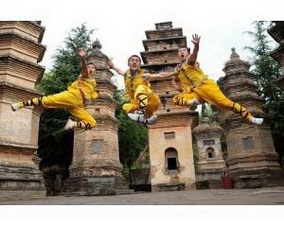 Chinese Martial Arts, or Wushu in Chinese, known in the West as Jung Fu, is a cultural heritage of the Chinese people which has been enriched through the ages. With its graceful movements and salubrious effects on health, it has a strong appeal to a vast multitude of people.
Chinese Martial Arts, or Wushu in Chinese, known in the West as Jung Fu, is a cultural heritage of the Chinese people which has been enriched through the ages. With its graceful movements and salubrious effects on health, it has a strong appeal to a vast multitude of people. Origin of Chinese Martial Arts
The origin of Wushu may be traced back to prehistoric times when the Chinese ancestors used stones and wooden clubs in hunting, both for subsistence and self-defense. In tribal strifes they used their tools of production as weapons of war.
Schools of Chinese Martial Arts
Because of its long history incorporating differences in culture, ideology. Region, and usage, Chinese Martial Arts has developed into a great variety of schools and styles. There are over one hundred schools of boxing in the Yellow River valley area and about eighty in the Yangtze River basin. Each school has its own characteristics. Changquan demands quickness and valor, and it is liked by young people. Taijiquan, characterized by its slow rhythm and gentle movements, is suitable for people of all ages, especially elderly people. Xingyiquan, vigorous in its balanced motions and poised steps, is popular with young and middle-aged people. Nanquan is widespread in China's southern areas. Its practitioners utter shouts and crises now and then to make their movements more forceful. Shanlinquan, popular in the north, is known for its short routines of movements and swiftness and vigor. In certain styles such as tanglang quan (the Mantis Boxing) and zuiquan (the Drunkard Boxing), the practitioner imitates animals and birds as well as drunken humans. 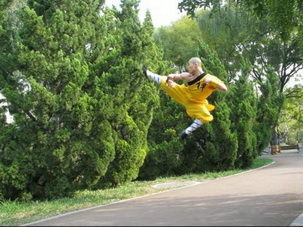
Wushu philosophy
Chinese Wushu is more than Kungfu. It embodies a profound philosophy and a sense of human life and social values. It is the summation of the code of conduct for the adjustment of the relationships between man and man and between man and natural. Wushu emphasizes traditions, experience and rational knowledge, all of which are clearly reflected in the martial ethics of Wushu. Martial ethics advocates respect for human life. In ancient China, human beings were regarded as the most valuable treasure of natural. Man is called one of the "four greats", together with the heaven, earth and truth, or law of natural activities, Chinese martial ethics requires that a person exercises self-restraint, never abusing his abilities to seek personal gratification or to oppress those weaker than himself. He should seek to uphold justice, remain fearless in the face of brutality, and cultivate modesty and a spirit of cooperation.
Chinese martial arts is not only a way to enhance one's health and skills. Its long association with dance has lent an enriching artistic quality. At the same time, its emphasis on posture composure, self-control, spirit, and lively exercise imbues it with a beautifying effect on the physic, and a positive effect on the character. These qualities turn Wushu into Wuyui-martial artistry.
Famous Kung Fu Actors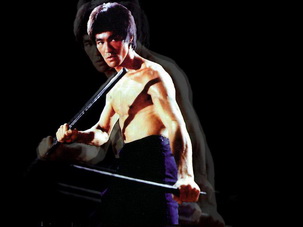
Bruce Lee (1940 - 1973)
Bruce Lee (November 27, 1940 - July 20, 1973) was a martial artist, philosopher, instructor, and martial arts actor widely regarded as the most influential martial artist of the 20th century. Born in San Francisco and raised in Hong Kong, Lee is best remembered for the presentation of Chinese martial arts to the non-Chinese world. His Hong Kong-produced and Hollywood-produced films elevated the traditional Hong Kong martial arts film to a new level of popularity and acclaim, and sparked the first major surge of interest in Chinese martial arts in the West. The direction and tone of his films changed and influenced martial arts and martial arts films in Hong Kong and the rest of the world. Lee became an iconic figure particularly to Chinese, as he portrayed Chinese national pride and Chinese nationalism in his movies. Many see Lee as a model blueprint for acquiring a strong and efficient body, as well as developing a mastery of martial arts and hand to hand combat skills.
Bruce Lee movies: the Big Boss, Fist of Fury, Way of the Dragon, Enter the Dragon, and the Game of Death.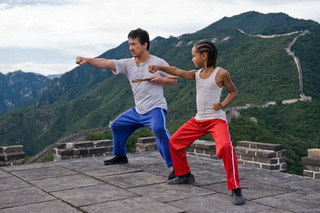
Jackie Chan (Born 1954)
Jackie Chan was born in 1954, the son of a poor couple who had just come to Hong Kong from the Province of Shandong, China. When he was born, his parents could barely raise the money for the hospital bill, and were almost forced to adopt him out to the delivering doctor. His parents tried very hard to raise money to pay the hospital bill and took Jackie, their only child, home. They named him Chan Kong-sang, which means "born in Hong Kong", to celebrate their safe arrival in Hong Kong.
Although Jackie's parents were poor, they had steady jobs at the French embassy in Hong Kong. Jackie's father, Charles was a cook and Lee-lee was a housekeeper. Together, the Chan family lived on Victoria Peak in Hong Kong. When Jackie was young, his father would wake him early in the morning and together they would practice kung fu. Charles Chan believed that learning kung fu would help build Jackie's character, teaching him patience, strength, and courage.
When Jackie was seven years old Charles took a job as the head cook at the American embassy in Australia. He felt that it would be best for Jackie to stay behind in Hong Kong to learn a skill and so enrolled him in the China Drama Academy where Jackie would live for the next 10 years of his life.
During Jackie's time at the school, he learned martial arts, acrobatics, singing, and acting. The school was meant to prepare boys for a life in the Peking Opera. Chinese opera was very different from any other kind of opera. It included singing, tumbling, and acrobatics as well as martial arts skills and acting. Students at the school were severely disciplined and were beaten if they disobeyed or made mistakes. It was a very harsh and difficult life but Jackie had nowhere else to go, so he stayed. He rarely saw his parents for many years.
When Jackie was 17, he graduated from the China Drama Academy. Unfortunately the Chinese opera was no longer very popular, so Jackie and his classmates had to find other work. This was difficult because at the school they were never taught how to read or write. The only work available to them was unskilled labor or stunt work. Each year many movies were made in Hong Kong and there was always a need for young, strong stuntmen. Jackie was extraordinarily athletic and inventive, and soon gained a reputation for being fearless; Jackie Chan would try anything. Soon he was in demand.
Over the next few years, Jackie worked as a stuntman, but when the Hong Kong movie industry began to fail, he was forced to go to Australia to live with his parents. He worked in a restaurant and on a construction site. It was there that he got the name "Jackie." A worker named Jack had trouble pronouncing "Kong-sang" and started calling Jackie "little Jack." That soon became "Jackie" and the name stuck.
Once Jackie got back to Hong Kong, Willie Chan took control over Jackie's career. To this day Jackie is quick to point out that he owes his success to Willie. However, the movies that Jackie made for Lo Wei were not very successful. The problem was that Jackie's talents were not being used properly. It was only when Jackie was able to contribute his own ideas that he became a star. He brought humor to martial arts movies; his first success was "Snake in Eagle's Shadow." This was followed by "Drunken Master" (another blockbuster) and Jackie's first ever directing job, "Fearless Hyena." All were big hits.
Jackie was becoming a huge success in Asia. Unfortunately, it would be many years before the same could be said of his popularity in America. After a series of lukewarm receptions in the U.S., mostly due to miscasting, Jackie left the States and focused his attention on making movies in Hong Kong. It would be 10 years before he returned to make Rumble in the Bronx, the movie that introduced Jackie to American audiences and secured him a place in their hearts (and their box office). Rumble was followed by the Rush Hour and Shanghai Noon series which put Jackie on the Hollywood A List.
Jackie's lifelong devotion to fitness has served him well as he continues to do stunt work and action sequences in his films. In recent years, Jackie's focus has shifted and he is trying new genres of film - fantasy, drama, romance - and is spending more and more time on his charity work. He takes his work as Ambassador for UNICEF/UNAIDS very seriously and spends all his spare time working tirelessly for children, the elderly, and those in need. He continues to make films in Hong Kong, including the blockbuster drama New Police Story in 2004.
Jackie Chan movies: Rumble in the Bronx, Rush Hour, Who Am I.
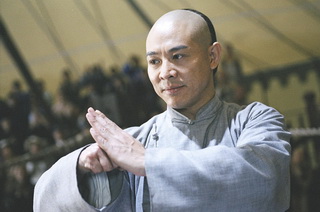
Jet Li (Born 1963)
One of the world's biggest action stars, Jet Li Lian Jie was born on April 26, 1963 in the outskirts of Beijing. At a young age, he developed an interest in Wushu. The school's teacher, Wu Ben, took an immediate interest to Li, seeing his natural talent. Over the years, Wu and Li would develop a father/son relationship, which was made all that much stronger since Li's own father died when he was two years old. Wu would often single out Li and give him extra tasks to do; Li at first felt bad about this, but in later years, he realized that Wu saw something in him and was only trying to bring it out. Li's skills developed quickly, and he eventually won many competitions and even performed in front of US president Richard Nixon at the White House as part of the Chinese/US cultural exchange during the 1970s'.
When Li was 19, he appeared in his first film, Shaolin Temple. Li was already regarded as a national hero for his athletic accomplishments, and the film (the first modern kung-fu movie made in China) shot him to superstardom in China. Fans flocked to various temples, hoping to imitate their hero. Li - a quiet and shy man - felt uncomfortable with his fame. He ventured into films with the idea of bringing interest of Wushu to the populace, not to become a star. Nevertheless, he continued to appear in a series of popular Shaolin films, such as Martial Arts of Shaolin (1986) and also directed a film, Born to Defence (also 1986).
Wishing to find a wider audience for his work, Li moved to America and appeared in 1989's Dragon Fight. The film failed to find an audience, but Li seemed determined to stick it out. Eventually, he hooked up with noted producer/director Tsui Hark and the two -- using some of their own money - created The Master in 1990. This time, the film (which had a miniscule budget and looked cheap even compared to many US B-movies) didn't even reach a distributor; it was shelved until 1992. But Tsui and Li had formed a bond and Tsui convinced Li to come with him back to Hong Kong.
It was with Tsui that Li found international stardom. 1991's Once Upon a Time in China, which had Li taking on the role of Chinese folk hero Wong Fei-Hung, was a huge hit and is now regarded as one of the best martial arts movies ever. The following two sequels were also very popular, so it was quite a surprise when Li quit the series. Rumors abounded of everything from money disputes to Triad "involvement." At any rate, Li moved away from Wong Fei-Hung - at least temporarily. After Swordsman II (1993), Li starred in another movie about a Chinese folk hero, Fong Sai Yuk (also 1993). The movie was again a huge hit, but perhaps more importantly, this was the first time he worked with Corey Yuen Kwai. Yuen would go on to work in some capacity on almost all of Li's next films, either as director or fight co-coordinator.
Li's next choice of a director to work with again puzzled many people. With Last Hero in China (1993), Li began a series of films that involved producer/director Wong Jing. Wong and Tsui Hark are quite the opposites in the HK film world; Tsui's films are known for being lavish, big-budget affairs with deep storylines, while Wong's (while equally popular with local audiences) are known for being cheap and full of sex, violence and crude humor. Many people (especially tabloid reporters) came up with many theories as to why Li worked with Wong. Some said it was due to Li's lingering resentment at Tsui; others surmised that Wong used Triad connections to "convince" Li to work with him. At any rate, Li's work during this period ranged from parody (Last Hero in China had Li once again playing Wong Fei-Hung, but for laughs, as in one scene where he dresses up in a rooster outfit) to romance (with 1994's The Bodyguard from Beijing, a HK remake of the Kevin Costner movie) to gun-fu action (such as 1995's High Risk, a movie "inspired" by Die Hard) and gained him a worldwide following of fans.
In 1994, Li, Yuen Woo-Ping and rising director Gordon Chan worked on a remake of Bruce Lee's classic Fist of Fury. Li was a bit hesitant to work on the film. He was hounded by billings of him being the "next Bruce Lee" his whole cinematic life, and Li knew (and himself felt) that Lee was somewhat of a "cinematic God" all around the world. Li, Chan and Yuen worked closely together to create a movie that would both satisfy fans of Bruce Lee, fans of Jet Li, and also (like the original film did) bring in new fans. They decided to forgo much of the wire-fu (a style which makes people seem as if they are flying, shooting fireballs or other exaggerated movements by using hidden wires and other camera tricks) Li used in most of his recent work (a result of being injured on the set on Once Upon a Time in China) and stick with a harder, more realistic style that was closer to Bruce Lee's own work. The result was Li's biggest success in years and what many people consider to be his best movie ever, Fist of Legend.
Despite the rumors about their relationship, Li went back to working with Tsui Hark with the Tsui-produced sci-fi/action extravaganza Black Mask in 1996. In 1997, Li once again stepped into the shoes of Wong Fei-Hung in the last movie in the OUATIC series, Once Upon a Time in China and America. After filming wrapped on Hitman (1998), Li was approached by American producers for the role of a villain in the latest installment of the popular Lethal Weapon series. Li, wanting to secure a steady future for his two children, took the offer -- as long as he was able to bring Corey Yuen over to direct his fight scenes. The film (despite lukewarm reviews) was a huge hit and successfully introduced Li to America. In fact, audiences responded so well to Li that his face and name were added to the film's poster after its' opening weekend.
Like Jackie Chan before him, Li's initial US success led to a spate of re-releases of his older work. Unlike Chan, though, these films (for the most part) were released uncut, besides some title changes and re-dubbed soundtracks - the US version of Once Upon a Time in China stands out as one of the best US video versions of a Hong Kong movie. In 2000, Li made his US starring debut with Romeo Must Die. While not a runaway success, RMD earned back three times its' budget and paved the way for future projects for Li, which may include an appearance in a sequel to The Matrix (which now seems unlikely since the producers only offered him US$3 million compared to his now-standard salary of $10 million) and a role as "Kato" in a remake of The Green Hornet. In 2001, Li struck at the US box office twice, with a film produced by La Femme Nikita director Luc Besson called Kiss of the Dragon, which premiered in the number four slot at the US box office (an impressive feat during the busy summer season) and garnered both critical and fan adulation, and The One which garnered Jet's biggest opening to date ($20 million) despite lukewarm reviews.
China Trip Planner | Travel Agents | About Us | Why Us | Contact Us | How to Pay | How to Book - Terms & Conditions | Site Map
Copyright © 2010 - 2030 All Rights Reserved.


 0086-28-85711328
0086-28-85711328 0086-28-85546015
0086-28-85546015




